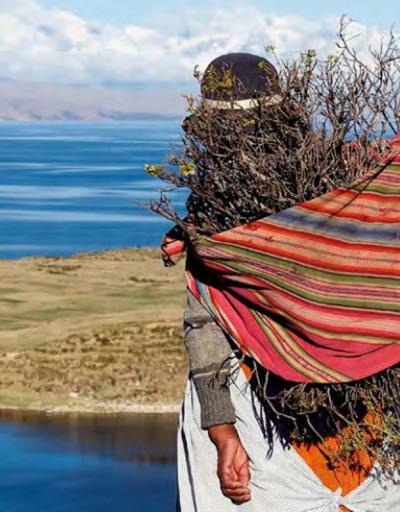
IPBES technical support unit on Indigenous and local knowledge

It provides policymakers with objective assessments about the state of knowledge regarding the planet’s biodiversity, ecosystems, and the benefits they provide to people, as well as the tools and methods to protect and sustainably use these vital natural assets. Its mission is to strengthen knowledge foundations for better informed policy, for the conservation and sustainable use of biodiversity, long-term human wellbeing, and sustainable development.
UNESCO-LINKS hosts the technical support unit on Indigenous and local knowledge of the IPBES.
LINKS and IPBES
IPBES has emerged as an influential and important process for informing decision making. The technical support unit based at UNESCO has facilitated and enhanced the participation of Indigenous Peoples and local communities, so that they can help to shape each of the IPBES assessments and other activities. There has been a significant uptake of Indigenous and local knowledge within each assessment, which in turn has influenced how science and Indigenous knowledge can be woven together to shape decision-making.
Main roles of the technical support unit
The main roles of the technical support unit are:
- Providing support to the IPBES taskforce on Indigenous and local knowledge in their work on development approaches and methods for working with Indigenous and local knowledge
- Providing capacity building and support to the authors of IPBES biodiversity assessments in implementing and further developing approaches and methods for working with Indigenous and local knowledge
- Facilitating participation of Indigenous Peoples and local communities in IPBES activities, and outreach and communication
Key activities and deliverables

The development and implementation of the "approach to recognizing and working with Indigenous and Local Knowledge in IPBES"
Development and implementation of pathways to facilitate the participation of Indigenous Peoples and local communities in IPBES assessments and other activities

Organising Indigenous and Local Knowledge dialogue workshops for the IPBES assessments (for example: sustainable use of wild species, values of nature)
Developing Indigenous and local knowledge resources for IPBES authors, Indigenous Peoples and local communities, including dialogue workshop reports, webinars, and materials from completed IPBES assessments
Impact
As a result of the work supported by the technical support unit, IPBES assessments have made significant advances in the ways they work with and include Indigenous and local knowledge, as has been demonstrated by the IPBES global assessment (completed in 2019) and the recent assessments on sustainable use of wild species and values of nature (completed in 2022).
These assessments give extensive consideration to Indigenous and local knowledge and to the natural resource management and governance systems of Indigenous Peoples and local communities. They highlight the importance of working with Indigenous Peoples and local communities for biodiversity conservation and sustainable use, as well as for conceptualizing and moving towards a better future for people and the planet.
IPBES definition of Indigenous and local knowledge
In paragraph 6. of the IPBES approach to recognizing and working with Indigenous and local knowledge, the definition is based on the following understandings of key terms, concepts and categories:
(a) Indigenous and local knowledge systems are in general understood to be dynamic bodies of integrated, holistic, social and ecological knowledge, practices and beliefs pertaining to the relationship of living beings, including people, with one another and with their environments. Indigenous and local knowledge is grounded in territory, is highly diverse and is continuously evolving through the interaction of experiences, innovations and various types of knowledge (written, oral, visual, tacit, gendered, practical and scientific). Such knowledge can provide information, methods, theory and practice for sustainable ecosystem management. Many Indigenous and local knowledge systems are empirically tested, applied, contested and validated through different means in different contexts;
(b) Maintained and produced in individual and collective ways, Indigenous and local knowledge is at the interface between biological and cultural diversity. Manifestations of Indigenous and local knowledge are evident in many social and ecological systems. In this context, the approach understands “biocultural diversity” as biological and cultural diversity and the links between them.

